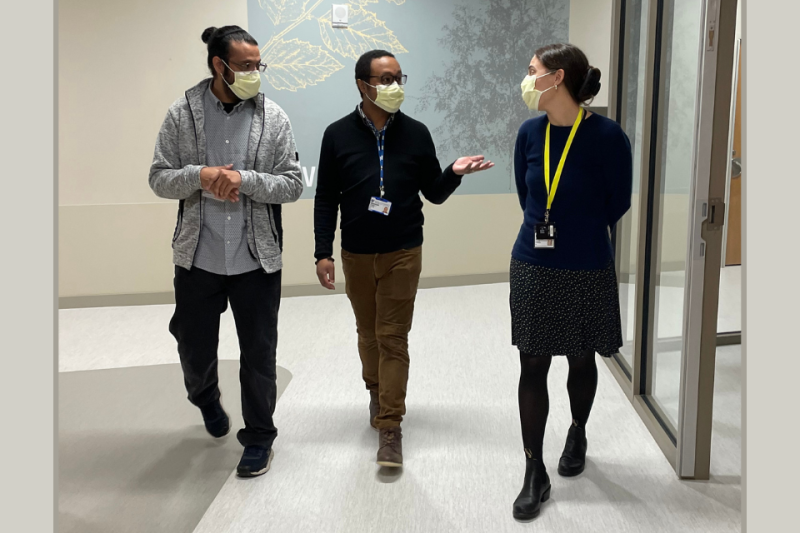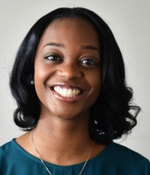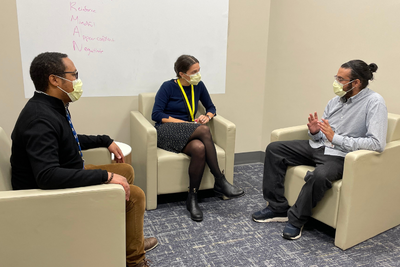
The psychology consult service on Duke Regional Hospital’s inpatient unit is one of the main things that attracted Briana Brownlow, PhD, to Duke as a clinical psychology doctoral intern in the summer of 2021. A year later, the prospect of building on her inpatient experience kept her at Duke as a post-doctoral clinical associate after she earned her PhD at The Ohio State University in spring 2022.
“It was a very unique training opportunity. You learn a lot about different interventions in a very in-depth way,” Brownlow reflected. “Doing inpatient, where you sometimes only meet somebody once, maybe twice, helped me with case conceptualization on the fly, being able to use a variety of interventions and flexibly and quickly figure out what might work the best. And you get a lot of interdisciplinary interaction with residents, nurses, social workers, and other team members.”
Although she’s not currently involved with the consult service at Duke Regional, Brownlow plans to continue inpatient work at Duke in a new role in the near future.
Assistant professor Jeremy Grove, PhD, who directs the service, also graduated from Duke’s clinical psychology doctoral internship program, where he participated in the inpatient psychology consult rotation in 2018. When was applying for internships, he recalls, he interviewed with multiple programs, and Duke’s was the only one with an inpatient psychology consult rotation. “We have something that’s pretty unique,” he noted. He returned to Duke as a faculty member in 2021.
About the Consult Service
Grove and two clinical psychology doctoral interns staff the service, providing one-on-one consults with patients and facilitating group sessions to help patients build skills to cope with challenges in their lives.
The consult process typically begins when a member of the care team, usually a psychiatry resident or attending physician, reaches out to a member of the consult team on behalf of a patient who might benefit from a therapy session. The consulting team member then meets with the referring provider, and sometimes others on the care team, to learn more about the patient and any particular concerns to be addressed in the consult.
Suicidal behavior is one of the most common patient issues that prompt a consult with Grove and his team. In these cases, for example, the consult team member often teaches the patient distress tolerance skills. “These are things the patient can do when they’re feeling really intense, painful emotions or engaging in problematic behaviors to short-circuit those responses—to turn the volume down on the distress and hopefully ward off another suicide attempt,” Grove explained.
“My goal was to give the patient something they can take with them. You’ve got to give them something quick that may not be sustainable, but it’ll work to get them through the moment.”
— Briana Brownlow, PhD

Brownlow likens the inpatient psychology consults to “the EpiPen of therapy.” “My goal was to give the patient something they can take with them. You’ve got to give them something quick that may not be sustainable, but it’ll work to get them through the moment,” like an EpiPen, she said. “I tried to give them something they could do themselves to manage their distress in the future, so they wouldn’t have to come back to the hospital.”
Grove notes that, for many patients, the consult is their first encounter with therapy. Most patients are receptive to it, and for some, gaining insight into their challenges and learning about other tools and strategies to address them can be a “mind-blowing,” life-changing experience.
Introducing patients to psychotherapy is one of the most enjoyable aspects of the rotation for clinical psychology doctoral intern Mohammed Alsubaie, MS. “Orienting them to what outpatient therapy might look like, trying to help them have a positive experience, and seeing that they’re motivated to seek therapy and give it a try on ‘the outside’ is really rewarding,” said Alsubaie, a PhD student at Seattle Pacific University.
A Different Perspective

According to Grove, psychologists and psychology trainees bring a unique skill set and perspective to the team that complements the expertise of other providers.
“There’s a ton that psychiatrists have to fit into their training, and psychological interventions are not a huge focus,” noted Grove. “We get years and years of training in this area, so we have a lot of experience and expertise when it comes to evidence-based treatments for various conditions.”
He adds that psychologists’ training enables them to delve a little deeper than other behavioral health specialists in understanding and isolating the contributing factors of a specific behavior, which helps them identify psychological interventions to target those specific factors and ultimately minimize or stop the concerning behavior.
Residents, medical students and nursing trainees regularly shadow the psychology team members through the initial consult with the referring provider, the one-on-one meeting with the patient, and the consult debrief with the referring provider. In addition, team members from different disciplines often engage in casual exchanges of ideas and perspectives.
For Julia Chafkin, MA, LPA, the other clinical psychology doctoral intern on the consult rotation this year, the diversity of perspectives has been a highlight of her experience on the inpatient unit. “It’s been a wonderful learning opportunity for me and I hope for the residents, too, to have a chance to learn to speak one another’s language a little bit, because we come from such distinct theoretical backgrounds,” she reflected. “I just love learning about how other people are approaching a case, especially when they have a different training background than I do.”
Alsubaie—who aspires to provide education, training, and supervision to students and other clinicians as part of his future professional practice in his home country of Saudi Arabia—particularly values the opportunities to share his clinical psychology knowledge and experience with other trainees and team members.
The benefits team members have gotten from these real-time informal learning opportunities have also led to the development of formalized learning experiences to foster continued mutual learning. This year, Brownlow facilitated a session on integrating cultural factors into acute care psychotherapy as part of the psychiatry residency’s Academic Half-Day didactic curriculum. She’ll also be leading a few educational seminars for residents, where she’ll cover topics related to identifying and implementing brief interventions in an inpatient setting.
Building a Unique Muscle
Chafkin, a PhD student at the University of Texas at Austin, has embraced both the rewards and challenges of this rotation, which is one day per week for the entire academic year.
She has enjoyed having the opportunity to try new things and see how they go. Sometimes, she says, she feels “really good” about a patient consult, and other times, she’s less sure of whether and how she’s helped the patient. Either way, she views her experiences as a learning process and works hard to figure out—with plenty of support from Grove—how she can continue to build her skills and hone her therapeutic approach.
“I think it’s a very unique muscle to build to walk in into that space and say, ‘Okay, we have about 45 minutes together. Let’s see what we can learn and what I might be able to give you.’”
— Julia Chafkin, MA, LP
“I get this really wonderful chance in the midst of a really difficult time to sit with someone and just be with them, to understand a little bit more about what they’ve been experiencing, and hopefully fold in the consult request,” Chafkin reflected. “I think it’s a very unique muscle to build to walk in into that space and say, ‘Okay, we have about 45 minutes together. Let’s see what we can learn and what I might be able to give you.’”
Alsubaie has been struck by how much can be accomplished in one session with a patient, though he admits that fitting in getting acquainted with each other, building rapport, engaging the patient in an assessment, and delivering an intervention in such a short time can be a formidable task.
In addition to the satisfaction of facilitating a productive session with a patient, Alsubaie appreciates the opportunity to learn critical professional skills—such as being flexible, thinking on their feet, and prioritizing goals based on patients’ most critical needs in a particular moment—that will help foster their success no matter where their paths take them.
Feature photo caption: Mohammed, Dr. Grove and Julia walk through the halls in the inpatient unit at Duke Behavioral Health North Durham.